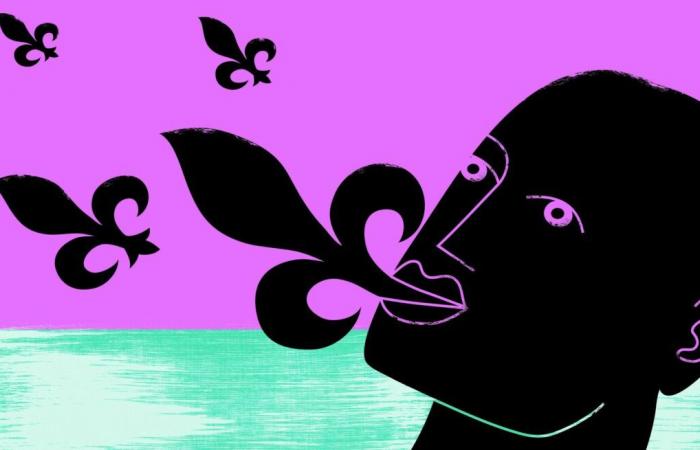Once a month from the pens of writers, Duty of literature proposes to revisit in the light of current events works from the ancient and recent past of Quebec literature. Discoveries? Proofreadings? Different look? Your choice. An initiative of the Académie des lettres du Québec, in collaboration with Duty.
When it comes to language, François Legault’s government is hardly a paradox. Its tenors continue to deplore a supposed “decline” of French in Quebec. Could immigration help slow it down? They prefer to transform this issue into an electoral bogey. Shouldn’t we invest in francization? Recent budget cuts show that their priorities lie elsewhere. Isn’t linguistic diversity a collective asset? They worry about the language citizens speak at home.
Such policies are all based on a supposedly natural link between the defense of French and that of the nation. The essayistic work of André Belleau (1930-1986) reminds us that things are not that simple.
Professor and essayist
In the Quebec intellectual landscape, Belleau’s career may be surprising. Before becoming a professor in the Department of Literary Studies at the University of Quebec in Montreal in 1969 and being recognized as an essayist during the 1980s, he was a civil servant for the Government of Canada.
As a professor, Belleau devoted himself essentially to two major projects: French literature of the Renaissance, around Rabelais, and Quebec romantic literature of the 20th century.e century. But, from the 1950s, he also published articles on music, cinema, television and literature. We especially know today the texts he gave to the magazine Freedomof which he was one of the founders in 1959.
Several were collected in a posthumous collection, Surprise the voices (1986). The “Debates” section brings together essays on independence, politics and language. Among these, two remain particularly relevant: “The Derome effect or how - colonizes and alienates its audience” (1980) and, above all, “Language and nationalism” (1983).
Media English
Belleau said of essayists that they had “the joy of inhabiting the semiosphere” (“Petite essayistique”, 1983). Where some only see things, essayists perceive signs and try to interpret them. In “The Derome Effect,” the sign that attracts Belleau’s attention is a simple pronunciation feature. Why, in the 1970s and 1980s, did Bernard Derome, the star television presenter on -, pronounce all foreign words as if they were English words?
What Belleau’s analysis reveals goes far beyond the case of Bernard Derome alone. The “amazing Canadian radio phonology” has the effect of dividing the world into two camps: those who speak English and the others. However, Belleau plays the opposite card: “Quebec unilingualism, a political, social, collective fact, must be accompanied on an individual level, as with the Danes, the Dutch, the Hungarians, by a sort of multicultural passion. »
Anyone interested in sport in the Quebec media, to take just this example, knows that the “Derome effect” is still rife there. If an athlete does not have an obviously French name, it is pronounced “English style”. How many Swedes, Slovaks and Russians have become Anglo-Saxon! There are even cases of local athletes transforming in our ears. One day it happened that founder Alex Harvey was renamed “Hââârvé” on the airwaves.
Need French
Already in 1980, Belleau said that “Quebec unilingualism” was self-evident: it was a “political, social, collective fact.” He dug into the issue in a 1982 lecture, “Language and Nationalism.” He subsequently wrote an essay from it, which his readers now know under the title “For an anti-nationalist unilingualism”. This title, which Belleau ultimately chose, is deliberately paradoxical. Its objective is to distinguish two things which until then seemed inseparable: the defense of nationalism and that of French.
The author of Surprise the voices would have had difficulty recognizing himself in the nationalist positions of the Coalition Avenir Québec (CAQ): he readily affirmed that he was an anti-nationalist federalist separatist. “I believe that independence remains the best way to get us out of the nationalist rut and that the government of a sovereign Quebec should share various skills with regional communities. We will not say that my position is not dialectical” (“The aesthetics of “yes””, 1980). This position remains unheard of in the Quebec political landscape to this day.
But why, then, defend French if it is not for nationalist reasons? The answer is in one sentence: “We don’t need to speak French, we need French to speak. » Writing this, Belleau does not relate the decision to speak a language to external factors. It is not a question, for him, of campaigning in favor of French to defend some reality external to him, the nation or, in another era, the nation and religion. What he says about French could also be said about any language. His numerous readings bear witness to this: for him, language is a “fundamental human faculty” which must be embodied in a language.
He who is deprived of this “fundamental faculty” is deprived of the world: “Men who see their speech despised simply do not speak. They are silencers. The silence of humiliation. » To put it another way: “For us, not speaking French means not speaking at all. » Without French, Quebecers would no longer be able to speak, at least until their language is replaced by another. However, for Quebec, Belleau did not believe this possible.
Today ?
André Belleau published “Language and Nationalism” in 1983. He then sought to “profoundly remotivate” the role of the State in linguistic matters. The reasons which led in 1977 to the adoption of the Charter of the French Language (Law 101) will not last forever. Belleau refuses to live in a “national linguistic park”. He advocates a “comprehensive national linguistic policy”. It is to youth that he addresses, to “children” and “the next generation”: “The facts, the reality always end up exploding the myths and the mystifications and, what is more, we do not have the right to lie to our youth, to those on whom we count to continue the struggle. »
What about in 2024? How to “remotivate” the defense of French? What “struggle” must be waged? Would Belleau recognize himself in the Act respecting the official and common language of Quebec, French (law 14, 2022)? The tests of Surprise the voices can fuel collective reflection.
Let us imagine a first extension of Belleau’s sentence which concerns me: “We need all French to speak. » The essayist was a fervent defender of French in Quebec, but he had ended, after a few years of reflection, in getting rid of all purism, all fetishism of the language. In “Language and Nationalism”, he frequently uses English (!) and the popular French of Quebec: “The truth is that languages are guidounes and not queens. » Speaking French in Quebec, in 1983 as in 2024, means exploiting all its resources. This is also one of the traits of Belleau’s style in Surprise the voices.
Let’s continue to use his sentence: “We need to understand French to speak. » What does that mean? It is not a question of highlighting knowledge, knowledge or academic mastery of French, but of promoting knowledge, knowledge or mastery which allows, for example, to mix the most knowledgeable French standardized, the popular Quebec language, popular French French, neologisms, English, etc. The role of the school is crucial in this matter. This is where a living language must be transmitted, as well as the recognition of the variety of language registers. In this regard, Quebec schools have a lot to do.
Lexical variation is not just a feature of Belleau’s writing or an educational principle to be instilled. It also refers to his refusal of “the famous equation State = nation = single language”. Belleau does not believe that this is “a clear and indisputable principle.” Rather, languages are continually in contact with each other, some dominant, others not. Many linguists now consider that taking this contact into account is fundamental.
The problem comes from the fact that in Quebec, we seem to think, at least in public discourse, that there are not several languages in contact, but only two, French and English. Belleau did not explore this reality. He died in 1986, before linguistic contact took the place it did almost 40 years later, particularly in Montreal. What would he have said, he who was so closely interested in the most recent developments in linguistics research?
Likewise, we do not know what he would have thought of the debates and legislative proposals of recent years. Would he have found, in the CAQ’s positions on immigration, the “multicultural passion” for which he claimed in “The Derome Effect” in 1980? Would he have believed, like the Quebec government, in a 2022 advertisement, that “the future of the peregrine falcon remains sketch » ? Would he have participated in demographic controversies over the very definition of what a French-speaker is in Quebec in the 21st century?e century ? Would he write again that it is “abusive, as Quebec discourse has been doing for so many years, to make language and culture synonymous”? How would he judge the government injunction to “love French”? (Are Germans asked to “love” their language?)
I will avoid attributing positions to André Belleau on the state of affairs in 2024. We do not know what they would have been. Has the “nationalist ideology of linguistic conservation” that he fought so fiercely in the 1980s evolved? Would he find the same defects there or would he have reason to hope for its reestablishment? How would he describe the language “environment” that is ours?
On the other hand, reading Belleau’s essays remains essential. Whether we are interested in subtle but revealing phenomena, or in an in-depth reflection on the need to speak French in Quebec, his thinking has lost absolutely nothing of its relevance. André Belleau, in Surprise the voicesis an excellent guide among “the signs of culture” and language.






